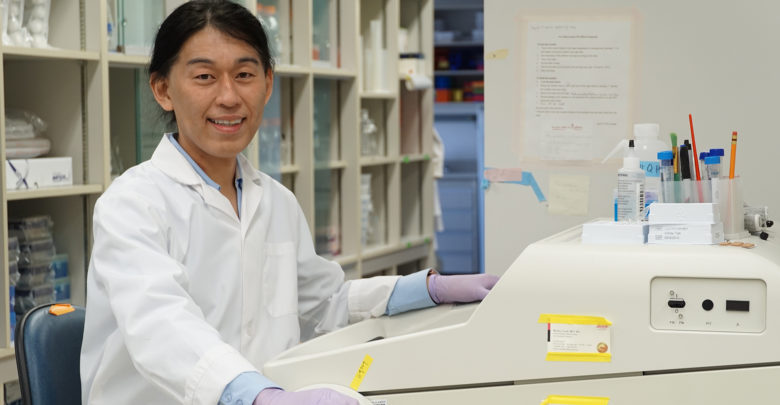 Supplied
SuppliedToshifumi Yokota, professor of medical genetics at the University of Alberta, and the Yokota Lab are working to advance techniques to help patients with genetic disorders.
For Yokota, the path from a childhood in northern Japan to an innovator holding the position as research chair in muscular dystrophy at the U of A has been marked by personal inspiration, international collaboration, and a determination to change the treatment landscape for genetic diseases. Yokota attributes their initial interest in medical research to the doctor who helped their mother after she suffered from a subarachnoid hematoma during Yokota’s childhood.
“At that time, the doctors used cutting-edge techniques like magnetic resonance imaging (MRI) and brain surgery,” according to Yokota. “They saved my mother’s life.”
Years later, while pursuing a PhD at the University of Tokyo, Yokota gravitated toward genetics and eventually muscular dystrophy research. This focus took Yokota from Japan to Imperial College London for postdoctoral training, where they began working with antisense oligonucleotides — small DNA-like molecules that can modify gene expression.
The work continued when they moved with his professor to Washington, D.C., where they made a significant leap in their study. Yokota pioneered the use of antisense oligonucleotide, being “the first study to demonstrate the therapeutic effect in large animal models of severe animal models of Duchenne muscular dystrophy.” That research laid the foundation for a drug approved by the Food and Drug Administration (FDA) in 2020.
Despite such achievements, Yokota acknowledges a few challenges in their work, saying, “the difference of a non-treated group and treated group is quite small.”
“There’s no significant effect on the heart muscle at all. Delivery is the biggest challenge that we are working on.”
Yokota Lab works to expand the growing field of exon skipping
In 2011, Yokota accepted a faculty position at the U of A and became the Friends of Garrett Cumming Research and Muscular Dystrophy Canada Endowed Research Chair — funded by local families, patient groups and Muscular Dystrophy Canada. Now, as a globally recognized leader in antisense therapy, Yokota and their team are working on getting more treatment groups to the clinical trial stage.
“We hope to further improve the effects [of treatments] using new technologies [and] start clinical trials in the next few years. We launched a new company to accelerate the development,” Yokota said.
Like most researchers, Yokota acknowledges that this won’t happen overnight, noting that FDA approval takes time. As Yokota described, their work was “published in 2009, [but] the drug developed based on that research was approved by the FDA in 2020.”
Still, they remain hopeful about developing another drug and securing FDA approval within the next several years. Exon skipping research, which once focused mainly on Duchenne muscular dystrophy (DMD), is now expanding to a broader range of neuromuscular and genetic diseases. Yokota stated that there are “more than 140 types of neuromuscular disorders” and thousands of untreatable genetic conditions, meaning that the potential applications are vast. So too are the resources required to realize such a goal.
Yokota’s lab at the U of A collaborates with international partners, including researchers in Japan and the United States, exchanging students and expertise across borders. While there are challenges with any project, Yokota remains enthusiastic.
“There are lots of exciting progress using complementary strengths of each institution. Lots of exciting things going on.”
As Yokota continues to push boundaries in genetic medicine, they remain focused on their original goal — creating effective treatments to help people.
“Antisense therapy and exon skipping can help people with these diseases and more in the future.”




